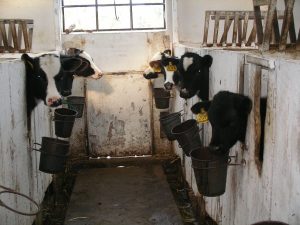Even though separation of mother from calf so early is based on good intentions in order to protect the calf from disease transmissions, there are several animal welfare concerns associated with this management practice. One important animal welfare aspect is being able to exercise natural behavior. Early isolation of calves deprives them of expressing suckling behavior, social contact and physical activity. Calves are highly motivated to suckle which is an innate behavior and the inability to do so leads to a negative affective state of stress and frustration. Nipple feeding provides a variety of benefits to the calf and a greater degree of relaxation. Suckling induces secretion of hormones important for digestion and satiety and it also increases the time calves spend sleeping. Calves are deprived from being able to express this natural suckling behavior when fed from buckets and 92.0% of producers use this method in Quebec.
Incorporating teat suckling systems for feedings will allow calves to express this important behavior. The mother cow is also deprived of exercising her natural maternal instincts and similarly to her calf, shows signs of distress when separated from her calf seen through increased vocalization and increased heart and respiratory rate. While it’s commonly believed that early separation is less stressful due to less contact spent between mother and calf, other research reveals that a very short time with the calf is enough to solidify a strong bond, even in absence of nursing.
Calves may also suffer from boredom due to lack of mental and physical stimulation in these small hutches. They are very restricted in motility and unable to exhibit play behavior and allogrooming that they naturally would with their mother or peers. Upon my own visits to a local farm in BC where calves were kept in outdoor hutches, I noticed some calves were chewing on metal wires, possibly due to a negative affective state.
Also, after separation, un-weaned calves are often given a conventional restrictive diet of 10-12% of their body weight per day and research has shown that calves suffer from hunger and giving larger amounts of milk has health benefits such as increased growth and improved mammary development.

Calves in confined housing on an organic dairy farm in Ecuador Photo Credit
